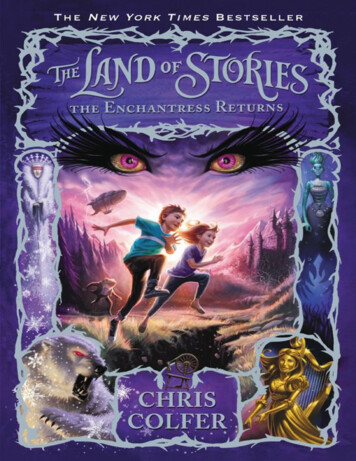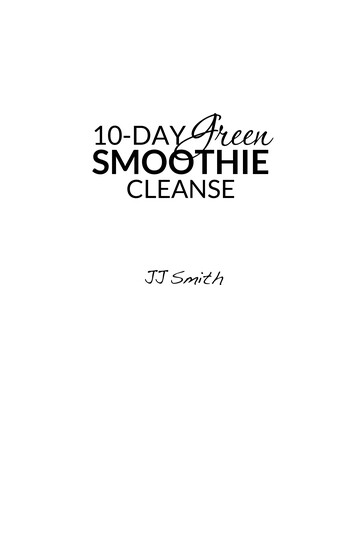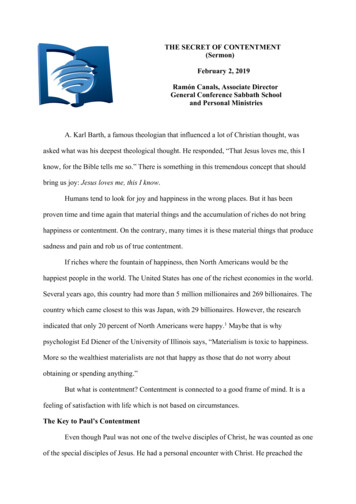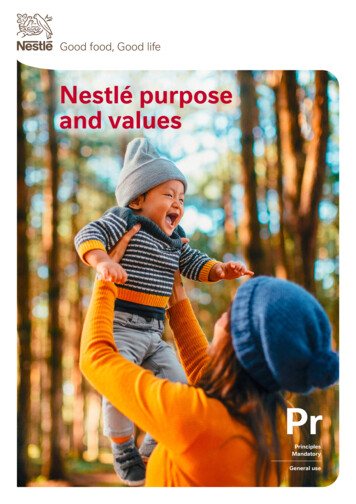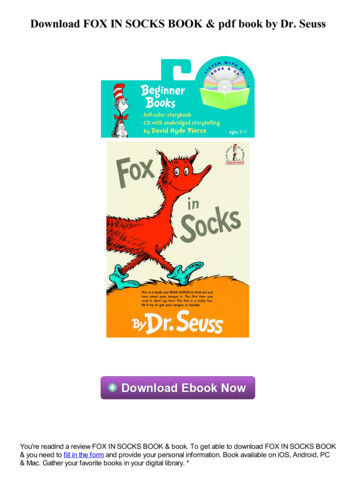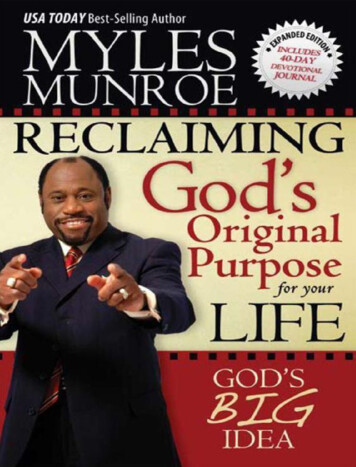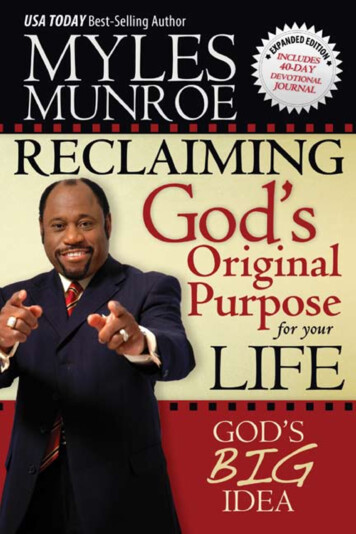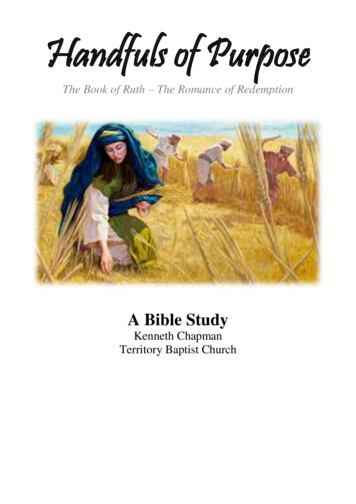
Transcription
Handfuls of PurposeThe Book of Ruth – The Romance of RedemptionA Bible StudyKenneth ChapmanTerritory Baptist Church
IntroductionRuth 1:1In this classic “rags to riches” story,the Book of Ruth opens with theThis reads likewords: “Now it came to pass in thedays when ” It immediately reminds us of oura novel, but itchildhood and the fairy tales of “Once upon a time,is not fiction.long, long ago.” The good news is that this is morethan just an imaginary story, with a happily everJ. Vernon McGeeafter ending, but that it can be a reality for us inChrist Jesus. H.V. Morton called it a rare combination of “literary art” andtheological insight.”There are two Books in the Bible that are named after women, the first isthe Book of Ruth, which begins with a funeral and ends with a feast. Theother is the Book of Esther, which begins with a feast and ends with afuneral. For some other contrasts, please note the chart below:RuthEstherA Gentile womanLived among the JewsMarried a Jewish man in the royalline of DavidA story of faith and blessingA Jewish womanLived among the GentilesMarried a Gentile man who ruled anempireA story of faith and blessingRuth’s name means “comely” or “friendship.” She is also listed in thegenealogy of Christ with these other women:1.2.3.4.5.TamarRahabRuthBathshebaMary1
The Book of Ruth contains only four chapters, just 85 verses, 2,578words and takes less than fifteen minutes to read. Yet, it is one of themost profound books of the Old Testament.It is part of the Megiloth or scrolls that would be readannually during the feasts of the Jews. Song of Solomon – Passover.Ruth – Pentecost.Lamentations – Anniversary of the destruction of Jerusalem.Ecclesiastes – Feast of Tabernacles.Esther – Purim.W.G. Heslop writesThe book of Ruth consists of less than 100 verses, and yet it wouldbe impossible to exhaust it during the lifetime of a ministerpreaching from it every Sunday. . .It is a garden enclosed, a minefilled with the rarest and richest gems and rubies, a treasury ofilluminating truths.MacDonald expounds the charm and beauty of this book by relating thefollowing incident from history.Benjamin Franklin, the American statesman and inventor,while serving at the French court, overheard some ofthe aristocrats “putting down” the Bible as beingunworthy of reading, lacking in style, and so forth.Though, not personally a believer himself, his youth in theAmerican colonies had exposed him to the excellence of theBible as literature. So, he decided to play a little trick on the French.He wrote out Ruth longhand, changing all the proper names toFrench names. Then he read his manuscript to the assembled eliteof France. They all exclaimed on the elegance and simplicity ofstyle of this touching story. “Charmant! But where did you findthis gem of literature, Monsieur Franklin?” “It comes from theBook you so despise,” he answered— “la sainte Bible!”2
BACKGROUND: ”Now it came to pass in the days when the judgesruled .” (Ruth 1:1). The story of Ruth takes place during the time ofthe Judges, known as “the Dark Ages” of the Hebrew people. Just as ajeweller displays a diamond against a dark velvet background, so Godshows the beauty of this book against the dark background of Judges.It has been called an addendum to the Book of Judges, an oasis in themidst of the desert, a beautiful lily in a stagnant pool.Pastor, Ho Soo Kam, from Singapore writesHere instead of unfaithfulness is loyalty, instead of immorality ispurity, instead of battlefields are harvest fields, instead of the warrior'sshout is the harvester's song, instead of hatred there is love; instead ofwar there is love, courtship and marriage, and instead of army lifethere is family life.Yet, it is important for us to notice that even during the ungodly time ofthe Judges, a period in which "every man did that which was right in hisown eyes" (Judges 21:25; 19:1; 18:1; 17:6), we find a godly couple inRuth and Boaz. It is also interesting to note, that the word “love” does notoccur in this "love story."Before we leave the background of Ruth, I would liketo mention that the Book of Judges is the book of “noking.” I Samuel is the book of “man’s king,” as thenation of Israel chooses Saul as their king. In II Samuel,we find “God’s King,” a man after God’s heart. Currently, we are livingin a world of “no king,” everyman is doing that which is “right in theirown eyes.” Soon the world will be clamouring out for “man’s king,” theantichrist, to solve the problems we are facing. But thank God we arelooking forward to the day when “God’s King,” the Lord Jesus Christ,will come and set up His Kingdom.Final note, the Book of Ruth is the eighth book of the Bible, the number ofbeginning again.3
KEY WORDS:As mentioned earlier it takes less than 15 minutes toread the Book of Ruth and I want to share with you some key words tonotice as you read. Remember, these key words will help unlock the textas you study this section of Scripture. God – 23 timesKinsman (‘s, men) – 14Redeem (ing) – 9Grace, Favour – 3Rest – 3Kindness – 3WRITER:The Book of Ruth was probably written during the timeperiod of David since he is mentioned at the end of the book and beforethe reign of Solomon. We also know that some of the former customswere no longer in practice at the time of writing (Ruth 4:7).OUTLINE:Several outlines have been offered for the Book of Ruth.They have been correlated and condensed into the chart below.LOVE'S RESOLVEFamine - Tears - Weeping - Sorrow - Gloom - Widow - DecisionLOVE'S RESPONSEField - Toil - Working - Service - Grace - Worker - DevotionLOVE'S REQUESTFloor - Trust - Wait - Submission - Goel - Woman - DesireLOVE'S REWARDFeast - Triumph - Wedding - Satisfaction- Glory - Wife - Destiny4
PRIMARY LESSONS:While there are many lessons andapplications to learn from this Book, five basic themes are: Christ – Our Kinsman Redeemer (Ruth 3:13). Gleason Archernotes that "the little book of Ruth is one of the most instructive in theOld Testament concerning the mediatorial work of the Lord Jesus." The Story of Grace – How God can take a Gentile, condemned by thelaw, and bring her into a covenanted relationship with Himself and Hispeople. Godly Living – It is still possible to live a Godly life in an ungodlyworld. The Providence of God – How God can work out the tiniest details ofour lives to accomplish his purpose. The Dangers of Backsliding. Establishes the Genealogy of Christ.5
Love’s ResolveRuth 1:1-22The first chapter of Ruth opens with a famine inBethlehemjudah and then later extends to Moab with thedeaths of Elimelech, Mahlon and Chilion. We also seeRuth’s becoming a widow with tears, weeping, sorrow and gloombecause of the death of her husband and the thought of being separatedfrom Naomi. Finally, her decision to stay faithful to Naomi and toNaomi’s God.DESPERATE CIRCUMSTANCES – As we mentioned earlier in ournotes, the Book of Ruth is taking place during desperate times. The Nation was Morally Destitute – “the judges ruled (Ruth 1:1).The nation of Israel is at an all-time low. God has repeatedly warnedthem to drive out the inhabitants of the land of Canaan (seeDeuteronomy 7:1-2). Yet, as a nation,they continually disregarded God’sSalvationSininstructions (Judges 1:21-33).Repeatedly, we read “And the childrenof Israel did evil again in the sight ofthe LORD” (Judges 3:7; 12; 4:1; 6:1;10:6; 13:1). This resulted in a four-foldSupplicationSufferingcycle that is repeated six or seventimes. The Nation was Materially Deficient – “there was a famine in theland” (Ruth 1:1). There are 13 famines mentioned in the Word ofGod and each of them is the result of the judgment of GodMany believe that this “famine” was caused by the attack of theMidianites in Judges chapter six. We read that “Israel was greatlyimpoverished because of the Midianites ” (see Judges 6:2-6).6
DANGEROUS CHOICES –Notice three mistakes he and his familymade during this famine experience. Chose to Leave the Promised Land – “ And a certain man ”Bethlehemjudah went to sojourn in the country of Moab (Ruth 1:1b).Instead of trusting in the promises of God during the famine (Psalm33:19; 34:9-10; 37:3, 19;84:11; Job 5:20-22; Proverbs 10:3;Matthew 6:31-33; Luke 22:35) they chose to leave the land ofpromise.The word Bethlehem means “House of Bread”the word Judah means “praise,” yet they arewilling to leave the place of God’s provisionand praise to dwell in the land of Moab.Bethlehem was known as the “granary of thecountry,” the land of “milk and honey” (Exodus 3:8). Chose to Live in a Polluted Land – Twice God calls Moab his“washpot” (Psalm 60:8; 108:9). The word means that they were adespised thing, compared to a vessel containing water to be used byslaves to wash the feet of a conquering hero.The country of Moab and theMoabites are mentioned nearly 200times in the Bible. The firstmention of them is found inGenesis 19 where we see the birthof two nations, the Moabites andthe Ammonites, the result of anincestuous relationship between Lotand his daughters (Genesis 19:3038). Both nations were known fortheir lawlessness and pride, bothopposed and attacked Israel andboth worshiped Chemosh andoffered human sacrifices.7
The chart below illustrates some of the contrasts between twocountries:Ammonites MoabitesWild and NomadicSettled and CivilizedHostility to God’s PeopleHospitality to God’s PeopleSubdueSeduce (Revelation 2:14)CurseCorrupt (Numbers 25)MurderMixedSatan – Lion, devourSatan – Serpent, deceiveChose to Linger in a Prodigal Land – “ And they came into thecountry of Moab, and continued there” (Ruth 1:1b-2). Initially, theywere only going to “sojourn” or live there temporarily (Ruth 1:1). Inverse two we read that they “continued there.” It becomes theirpermanent residence and by the time you get to verse four we read,“they dwelled there about ten years.”Sin will take you farther than you want to go!Sin will keep you longer than you want to stay!Sin will cost you more than you want to pay!DEADLY CONSEQUENCES – The first to diewas Elimelech Naomi's husband (Ruth 1:3). Ten yearslater, both Mahlon and Chilion died (Ruth 1:5).Elimelech’s name means “My God is King” and whilethere is some debate as to the meaning of his sonsMahlon and Chilion’s name, they seem to have theconnotation of “a weak song” and “piningperfectness” (see J. Sidlow Baxter and Graham Scroggie).8“ be sureyour sin willfind you out.”Numbers 32:23
When we make the wrong decisions about the world, the first thing welose is the testimony of my God is King. Shortly thereafter we lose ourjoy and song and then our outward appearances of perfectness changes.Remember, while we have the freedom to choose, we cannot escape theconsequences of those choices. You make the choice and then thechoice makes you.DISOBEDIENCE COMMITMENTS – Elimelech’s disobedienceaffected his son’s disobedience in their selection of wives. “And theytook them wives of the women of Moab; the name of the one was Orpah,and the name of the other Ruth: and they dwelled there about ten years”(Ruth 1:4).The Bible clearly forbids them from marrying Orpah and Ruth(Deuteronomy 7:3-4). Likewise, in the New Testament the Bible is veryclear that a believer should only marry a believer (I Corinthians 7:39; IICorinthians 6:14-16).DESTITUTE CONDITIONS – “ and the woman was left of hertwo sons and her husband” (Ruth 1:5b). Listen to her lament upon herreturn to land of Judah, “Call me not Naomi, call me Mara: for theAlmighty hath dealt very bitterly with me. I went out full, and the LORDhath brought me home again empty: why then call ye me Naomi, seeingthe LORD hath testified against me, and the Almighty hath afflicted me?(Ruth 1:20-21). Once again, notice the meaning of names. Naomi’sname means “pleasant;” now she calls herself“Mara” or “bitter” (see Hebrews 12).She used to be an Ephrathite, an ancient wordfor Bethlehem which meant “fruitful,” now sheis living in a place of emptiness. She also statesthe Lord hath “testified” or answered againsther and “afflicted” or broken her. Remember,whenever we break God’s commandments,they always break us!9
DISCOURAGING COUNSEL – Naomi had heard “ how that theLORD had visited his people in giving them bread” (Ruth 1:6). After shemakes the decision to return “home” she has second thoughts about takingOrpah and Ruth back to land of Judah.The Law of Moses calledLevirate Marriage in which aman was required by law tomarry the widow of a brotherwho had died with no male heir.Levirate means “husband’sbrother (Deuteronomy 25:5).Perhaps she is just being pragmatic,realizing that they have a better chance ofremarrying in Moab. Possibly she feelsunworthy of their love and the sacrifice theywould be making to return with her, ormaybe she is embarrassed to be seen withthem, a reminder of the mistakes of thepast.Regardless of the reasons, at least three times Naomi counsels Orpah andRuth to return to their people in Moab.DEFINITE COMMITMENT – It was ona dusty road inside the country of Moab thateach widow had to make a decision aboutwhether or not to follow Naomi and Naomi’sGod. It was at this crossroad, that Orpah andRuth had to count the cost and consider therisks of going to Judah and leaving everythingthey had ever known behind them. The Widow of Restoration – Naomi is a grieving widow returningto her homeland (Ruth 6:13). Perhaps William Kirkpatrick’s hymnis on her lips as she begins her journey home.I’ve wandered far away from GodNow I’m coming home.The paths of sin too long I’ve trodLord, I’m coming home.10
The Widow of Rejection – Orpah’s name comes from the root for“neck” and implies stiff-neckedness (Exodus 32:9). She is the leavingwidow, perhaps she has set on eyes on some guy from Moab or maybeshe has an interview to host a daytime talk show – oops, that wasOprah (Ruth 1:14).1. She Returned to her Relatives.2. She Returned to her Religion (see II Peter 2:22) The Widow of Redemption – Ruth is the cleaving widow (Ruth1:15-18). Note her fivefold commitment:1.2.3.4.5.New Land (16) – “Whither thou goest, I will go”New Lodging (16) – “Where thou lodgest, I will lodge.”New Lineage (16) – “Thy people shall be my people.”New Lord (16) – “Thy God my God.”New Loyalty (17) – “Where thou diest, will I die.”DESIRED CONTENTMENT – The trip from Moab to Bethlehemwould have taken between 7-10 days. It would require them crossingthe river Jordan and climbing a 2000-foot-high mountain to get backhome (Ruth 1:19-22). It seems so easy in backsliding, it is all downhill,but returning is always an uphill climb. The Place of God’s Praise – Remember, the word Judah means“praise.”The Place of God’s Presence – “the Lord had visited his people”The Place of God’s People – “all the city was moved about them”The Place of God’s Provision – God provides both “barley” and“corn.”The Place of God’s Providence – “theLord hath brought me home again.”The Place of God’s Perception –While Naomi referred to herself as“Mara,” the Holy Spirit still records heras “Naomi.”11
Love’s ResponseRuth 2:1-23Chapter two the focus changes to Ruth as a worker in thefield (occurs 7 times in this chapter). It is here that sheworks, toils and serves Naomi, it is also here that shefinds grace and meets Boaz, who notes her devotion to her mother-inlaw and God.There are three major characters in this chapter: BOAZ – A Man of ValourRUTH – A Maiden of VirtueNAOMI – A Mother-in-law of ValueRUTH’S UNSEEN GUIDANCE – Oftentimes, God is at work inour lives and we do not even realize it. Like Jacob, who “ awaked out ofhis sleep, and he said, Surely the LORD is in this place; and I knew it not”(Genesis 28:16). In the Book of Ruth, we see God’s Guidance in at leastfour areas. THE PREPARATION OF BOAZ – “And Naomihad a kinsman of her husband's, a mightyman of wealth, of the family of Elimelech;and his name was Boaz” (Ruth 1:1). Theword “and” is used as a conjunction inintroducing Boaz to our story. He willquickly become a prominent person in ourRomance of Redemption. Note that he was:1. A Man of Relations – “a kinsman of her husband” (Ruth 2:1a).According to rabbinical tradition, Boaz was Elimelech’snephew.2. A Man of Resources – “a mighty man of wealth” (Ruth 2:1b). Itseems that he not only survived the “famine,” but he thrived.12
3. A Man of Reputation – “his name was Boaz” (Ruth 2:1c). Hisname means “in him is strength.” His name is so significant that200 years later Solomon would named one of the two pillars atthe entrance of his Temple “Boaz.” The other pillar was namedafter Jachin, which means “to be established” (I Kings 7:21; IIChronicles 3:17). THE PROBLEM OF PAIN – Pain, hunger andneeds are one of God primary tools tomoved us. “And Ruth the Moabitess saidunto Naomi, Let me now go to the field, andglean ears of corn after him in whose sightI shall find grace. And she said unto her,Go, my daughter” (Ruth 2:2).The eldest servant of Abraham testified, “I being in the way, theLord led me” (Genesis 24:27). There is a Latin proverb that says:“Providence assists not the idle.” God often leads us throughperspiration (hard work), as much as through inspiration. Someonesaid, “Even God won’t steer a parked car.”Ruth starts out by looking for a field, but she finds favour; lookingfor some food, but she finds a feast. She is hoping to find a mealand some work, not realizing that God has a man and a weddingplanned for her (Psalm 30:11 see Psalm 30:11).Blaise Pascal, a famous French mathematician and philosopher, putit like this:There is a God-shaped vacuum in the heart of every man whichcannot be filled by any created thing, but only by God theCreator, made known through Jesus Christ.” THE PRINCIPLES OF SCRIPTURE – God will never lead us contraryto the Bible. Israel’s welfare system of gleaning is based on severalOld Testament Scriptures. We will be looking the Laws of Gleaninga little bit later.13
THE PROVIDENCE OF GOD – Not just chance or circumstances.“And she went, and came, and gleaned in the field after the reapers:and her hap was to light on a part of the field belonging unto Boaz,who was of the kindred of Elimelech” (Ruth 2:3). The word hap”means “chance or happenstance.” But God has a way of makingthose haps His maps (Proverbs 16:33).The word circumstance is derived from the Latin, circum, whichmeans around and the word stance or stand, thus circumstances arethe things that stand around you. The Holman Bible Dictionarydefines Providence as “God’s faithful and effective care andguidance of everything which He has made toward the end whichHe has chosen.” Coincidence is when God is working undercover.Ruth did not just receive a lucky break, but a loving blessing;she was not just fortunate, but favoured.BIBLE CONTRADICTIONS?In chapter one we read about the “barley harvest” now weAre talking about “ears of corn” (Ruth 1:22 cf 2:2). Is thisa contradiction of Scripture? No – we must allow Scriptureto interpret Scripture (I Corinthians 2:13).In the Gospel of John, Jesus speaks of “a corn of wheat,” the word cornspeaks of the “kernel” or the grain of the barley (John 12:24).Webster’s Dictionary tells us that the word corn comes from the MiddleEnglish, from Old English; akin to Old High German & Old Norse korngrain, Latin granum. And it means the seeds of a cereal grass andespecially of the important cereal crop of a particular region (as wheat inBritain, oats in Scotland and Ireland, and Indian corn in the New Worldand Australia).The word “ear” simply refers to the spike to which the corn or kernels areattached.14
RUTH’S UNMERITED GRACE – The words “grace, kindnessand favour” are used four times in this chapter (Ruth 2:2, 10, 13, 20).Grace has been defined as “God’s Riches At Christ’s Expense.”Mercy has been described as not receivingwhat we deserve and grace is receiving whatwe do not deserve. As we consider grace inthis chapter our attention is drawn to Boazand his greeting to his reapers, “ The LORDbe with you” Ruth 2:4). One authormentioned that the first words that a Biblical character speaks is anindication of their true nature. Remember, we will never have a secondchance to make a good first impression.The second thing that we notice is that grace or in this case, Boaz takesthe initiative both in enquiring about her and in speaking to her (Ruth2:5, 8). As a Moabitess, Ruth was a foreigner and rejected damsel,but because of grace she is looked on as family and accepted“daughter”. Likewise, we were “aliens,” “strangers and foreigners”without “hope” and “without God;” but for the grace of God (Ephesians2:12, 19, 8-9). “We love him, because he first loved us” (I John 4:19).Just as grace in the New Testament leads us to works, “For we are hisworkmanship, created in Christ Jesus unto good works ” (Ephesians2:10); so Ruth is given instructions, protection and provisions (Ruth2:8-9).Finally, this grace is amazing, note her response: “Then she fell on herface, and bowed herself to the ground, and said unto him, why have Ifound grace in thine eyes, that thou shouldest take knowledge of me,seeing I am a stranger? (Ruth 2:10 – this was an act of respect andgratitude I Samuel 25:23; I Kings 1:31). She had left home thatmorning, ready to work, but now she is wondering why Boaz “shouldesttake knowledge” of her.Nor can I understand why God should take knowledge of me it’ssimply amazing!15
RUTH’S UNMATCHED GOODNESS – In verse 11, Boazcomments on all that Ruth “hast done” and sumsthem up in three points: ALLEGIANCE with her mother in law (2:11a)ABANDONMENT of her homeland (2:11b)ADAPTATION of Bethlehem (2:11c)RUTH’S UNDENIABLE GOD – Boaz prays that " The LORDrecompense thy work, and a full reward be given thee of the LORD Godof Israel, under whose wings thou art come to trust” (Ruth 2:12).Australian author, Leon Morris believes that this verse is the key versein the Book of Ruth. The word “recompense” speaks of a covenantrelationship of peace (Ruth 2:11-12). When Ruth trusted in theGod of Israel she entered a covenant relationship with God. Boazcomments on, THE COVENANT REASSURANCE – “The LORD recompense thywork,” speaks of the peace and soundness of her standing.THE COVENANT RESOURCES – “ a full reward be given thee”speaks of the provision and supply of her service.THE COVENANT REFUGE – “ under whose wings thou art come totrust” speaks of the protection and security of her shelter.RUTH’S UNEXPECTED GIFTS – Once again we see Boaz’sgenerosity in his care of Ruth as he “ commanded his young men,saying, Let her glean even among the sheaves, and reproach her not”.(Ruth 2:15). He then further states “And let fall also some of thehandfuls of purpose for her, and leave them, that she may glean them,and rebuke her not” (Ruth 2:16). THE BIBLICAL LAWS OF GLEANING – There are several passages ofScripture defining gleaning (Leviticus 19:9; 23:22; Deuteronomy.24:19-22). J. Vernon McGee, believes they would leave about 30%of their harvest for the poor, he went on to say that this was not ahand-out, but a hand-up, they had to work for it.16
THE BLESSED LOVE OF GIVING – Boaz’s fields become her fields,his food becomes her food.1. Restrains – He restrains his young men from touching,reproaching and rebuking her (Ruth 2:9, 15, 16).2. Refreshes – He sits with her, sups with her and sufficed her(Ruth 2:14).3. Replenishes – “handfuls of purpose” (Ruth 2:16). Ordinarily wewould say handfuls on purpose but the Bible emphasis in on thepurpose more than on the handfuls. Perhaps we give moreemphasis to the Giver than to His gifts.Ruth’s Unlimited Gleanings –“So she gleaned in the field until even, andbeat out that she had gleaned: and it wasabout an ephah of barley” (Ruth 2:17). An“ephah” is about 22 litres dry capacity andweighs about 15 kilograms. It contains tenomers and one omer of manna wassufficient for one person per day, thus, Ruthgathered enough to last them five days.According to documents from Babylonaround that time, harvesters would takehome about one kilogram a day, meaningRuth was able to glean about 15 times theamount of the average reaper.SIFTING THE GRAINAfter gleaning the barley,Ruth had to continue tolabour in “beating” outthe grain (Proverbs12:27).In verse 18, we read about what may be the first “takeaway” meal in the Bible as she brings Naomi her leftoversfrom lunch .“Now unto him that is able to do exceeding abundantly above all thatwe ask or think, according to the power that worketh in us” (Ephesians3:20).17
RUTH’S UNPARALLELED GLADNESS –Before this, Naomiexpressed herself with bitterness, but now she expresses blessedness. Shepraises the Lord for help for the present and for giving hope for the future(Ruth 1:20 cf 2:20).Note that when Naomi asked Ruth“where” she gleaned, Ruth began talkingabout “whom” she gleaned with (Ruth2:19). It not a place, but a person; notthe land, but the Lord.Note also that Ruth states who she gleaned “with,” not who she workedfor. She then shares her testimony of God’s protection and provisionthrough the man Boaz (Ruth 2:20-23).“BLESSED BETHE LORD, WHODAILY LOADETHUS WITHBENEFITS, EVENTHE GOD OF OURSALVATION.SELAH.”PSALM 68:19Not only is she given new resources fromthe field of Boaz, Ruth also develops newrelationships with the men, the maidensand most importantly with the master ofthe field. These relationships are vital toour Christian walk. Someone wrote thatsheep are social creatures, the only timeyou find them alone is when they are sickor wounded. Remember Paul’s admonitionin Hebrews 10:25: “Not forsaking theassembling of ourselves together, as themanner of some is; but exhorting oneanother: and so much the more, as ye seethe day approaching.18
Love’s RequestRuth 3:1-18In the third chapter, we find the woman Ruth approachingBoaz at the threshing floor. It is here where she places hertrust in her Goel or “kinsman-redeemer.” She now placesherself at Boaz’s feet, waiting for his response. We alsosee her submission as he acts on her behalf and her desire to comeunder his care.PREPARATION – NAOMI’S RESOLVE – For the last six to eightweeks, Ruth has “ kept fast by the maidens of Boaz to glean unto theend of barley harvest and of wheat harvest; and dwelt with her motherin law (Ruth 2:23). I am sure the weeks have flown by, harvest time isalways a busy and joyful time. But what now – where does Ruth gofrom here? Where can she find rest? (The word “rest” in its variousforms appears nearly 300 times in the Bible)OUR SOULS ARE RESTLESS UNTIL THEY FIND THEIR REST IN THEE.AUGUSTINE THE REST THAT THE WORLD OFFERS – Several monthsbefore in chapter one Naomi challenges both Ruth and Orpah to“find rest” in Moab (Ruth 1:9). At this point Naomi is stillbackslidden and her spiritual perception is wrong. Thus, her adviceis mistaken, misguided and misinformed. The world can neversatisfy a hungry soul.1. The Possessions of this World – “For what is a man profited, ifhe shall gain the whole world, and lose his own soul? or whatshall a man give in exchange for his soul?” (Matthew 16:26). Ithas been said: “Money will buy a bed but not sleep, books butnot brains, food but not appetite, finery but not beauty, a housebut not a home, medicine but not health, luxuries but not culture,and amusement but not happiness.”19
“MILLIONAIRESSELDOM SMILE ANDNEVER LAUGH.”ANDREW CARNEGIESomeone once said, “I just cannotunderstand it, she had so much to livefor.” To which another replied, “No, shehad so much to live on, but nothing tolive for.” (see Proverbs 3:13-15).2. The Pleasures of this World – Lord Chesterton once said, “Ihave run the silly rounds of pleasure, and by no means desire torepeat the nauseous dose.” The Apostle Paul wrote: “But she thatliveth in pleasure is dead while she liveth” (I Timothy 5:6 also seeJames 5:5).3. The Popularity of this World – Even a casual reading of thenewspaper or browsing of the internet and social media revealsthat popularity does not buy happiness (see the Book ofEcclesiastes). THE REST THAT THE LORD OFFERS – “Then Naomi hermother in law said unto her, My daughter, shall I not seek rest forthee, that it may be well with thee?” (Ruth 3:1 – the phrase “mydaughter appears 16 times in the Bible, 8 times in the Book of Ruth).In chapter one, Naomi was resentful and bitter and in chapter twoshe was reclusive, but beginning to hope again. Now in chapterthree we find that her hopes have been renewed and she seeks to bea blessing instead of a burden. Instead of feeling sorry for herself,she is focusing on the wellbeing of Ruth.This section of Scripture reminds me of the Matchmakerfrom Fiddler on the Roof as she points to Boaz for “rest”(Ruth 3:2). This is known as the levirate law from the Latinlevir meaning “husband’s brother” (Deuteronomy 25:5-10cf Genesis 38). This law provided for the well-being of thewidow, any off spring would be given the name of the first husbandand the land would remain in the family. It was based on this lawthat the Sadducees questioned Jesus about the resurrection (Matthew22:23-29).20
ROLES OF THE KINSMEN-REDEEMER In the case of Harm & Murder - The Avenger of Lost Life(Numbers 35:19-21).In the case of Helplessness & Mishap - The Deliverer of Lost Land(Leviticus 25:25-28, 47-49).In the case of Heritage & Marriage - The Redeemer of Lost Love(Deuteronomy 25:5-10)It is also important to note that the widow was responsible totake the initiative in this relationship.Next notice Naomi’s advice in seeking Boaz to make “herself ready”(Revelation 19:7). Likewise, we should purify ourselves (I John 3:3).1. Cleanse Ourselves – “Wash thyself(Ruth 3:3a cf I John 1:7-9).2. Consecrate Ourselves – “anoint thee”(Ruth 3:3b). There are two purposesfor anointing in the Bible – commonand ceremonial for setting someoneapart for special service (I John 2:27and I Samuel 16).3. Clothe Ourselves – “put thy raimentupon thee” (Ruth 3:3c). I am sure thather clothing was both appropriate andattractive.1,500 years before thebirth of Christ, thequeen of Egypt sentscouting parties allaround the knownworld to bring her thelatest perfumes forher co
the Book of Ruth, which begins with a funeral and ends with a feast. The other is the Book of Esther, which begins with a feast and ends with a funeral. For some other contrasts, please note the chart below: Ruth Esther A Gentile woman A Jewish woman Lived among the Jews Lived among the Gentiles Married


